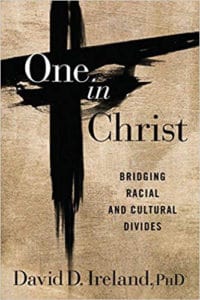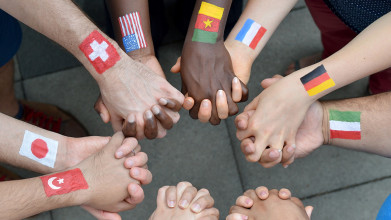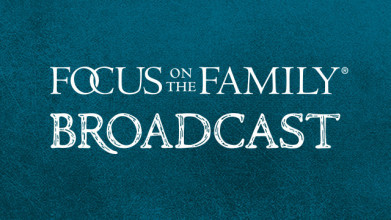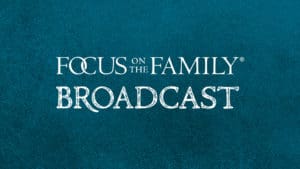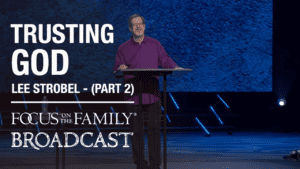John Fuller: Today we celebrate the visionary leader and agent of social change, Dr. Martin Luther King, who is probably best known for his iconic speech, I Have a Dream, which he gave more than 50 years ago on the steps of the Lincoln Memorial in Washington, DC. Dr. King spoke, of course, of his dream that America will one day live out its creed that all men are created equal. And he described his hope that different races would join together as brothers and sisters. And that seems like an appropriate topic this week, as we also celebrate the sanctity and value of human life. I’m John Fuller. This is Focus on the Family with your host, Focus president and author Jim Daly.
Jim Daly: Uh, John, I think everyone can acknowledge that we’ve made some great progress in this country. I was born in 1961, so, uh, I was little during the civil rights movement. I was a young boy. But, uh, I lived in southern California. And, you know, there was a lot going on across the nation when it came to equality and treating people with respect. It certainly is core to the Christian faith. I love that Scripture where the Lord says, “Love me with all your heart, and love your neighbor.” And that doesn’t say, uh, you know, “Love only the people that look like you, talk like you, come from your same kind of cultural background.” What’s amazing in America is we have a wonderful opportunity to demonstrate this. We just aren’t there quite yet. And we need to lead the way as Christians, I think, and I know our guest thinks so as well. Uh, that’s why we want to address the issue today. Is to, hopefully, give you some thoughts and ideas on things you can do differently to reach out to your neighbor, like Jesus wants you to do. And we’re gonna talk today with a great guest, who’s r- written a wonderful book called One in Christ. Isn’t that the way it should be? Wonderful title. One in Christ by Dr. David Ireland.
John: And he has been here before on Focus on the Family, and we’re glad to have him back. He’s the founder and pastor of Christ Church, which is a large, multi-site ministry in northern New Jersey. Dr. Ireland has written about 20 books, I think. And today, we’re going to explore, as you said, Jim, uh, some of those cultural, uh, tension points and divides from a biblical perspective.
Jim: Dr. Ireland; David, if I may, welcome back to Focus.
Dr. David Ireland: Oh, my pleasure, Jim. John, thanks for the opportunity to come back and speak to you and your listening audience.
Jim: Yeah. Now, I just gotta, you know, let people know, you’re pastoring in New Jersey. How’s that going? (laughs)
Dr. Ireland: (laughs)
Jim: Or should I say, how’s that goin’?
Dr. Ireland: Okay. (laughs) I still don’t have a New Jersey accent.
Jim: (laughs)
Dr. Ireland: But it’s going well. (laughs)
Jim: (laughs) It’s so fun, though. I mean, New Jersey. I- I need to visit there more, because I think I’ve only been to the cities, not out to the pretty parts of New Jersey.
Dr. Ireland: Well, New Jersey’s a very diverse, uh, state. It has anywhere from, uh, farms to alpacas to, you know, (laughs) the iron-bound areas and so-
Jim: Out here we don’t imagine that. It’s like New York: it’s only one big city. It’s not the apple orchards up north. But we do get it, everybody. So, uh, David, let’s start with the church today. You are pastoring a- a large church, a multicultural church. Um, I think the question is, why do you believe … as- a term you used in your book, “monoculturalism.” Uh, w- what is that, and how does it divide us?
Dr. Ireland: Monoculturalism simply means “mono,” one, and “culture” speaks of foods that you eat. The movies that you watch. The way you look at the world around you, so to speak. And the monocultural lens is a very limited lens, because when you live in America, particularly in our era, this is a very diverse country. And the church I pastor has about 70 different nationalities that call Christ Church home. About, uh, 9200 people that are active in its membership. And so, I’ve had a chance to walk this out, and I have to walk it out every single day. So it’s not a theory to me. It’s- it’s something I have to practice.
Jim: What are- what are some of those, I guess, dangers, of a monocultural approach? And- and you know, some people are a little negative toward multiculturalism. W- why do we need to be more open to say, “Hey, it’s okay to embrace a variety of cultures. But as Americans, we all kind of need to move together.” Uh, how do we balance all that?
Dr. Ireland: I- I think some people are afraid of multiculturalism, simply because they are either have no experience towards it, or they feel as if; and some have wrongly defined it; that multiculturalism is the … It’s almost as if you’re dumping all the cultures into one melting pot. And it’s not that. It’s a tossed salad. So the lettuce tastes distinctly different than the tomatoes, and the onions, and the croutons.
Jim: Well, let me ask you, then, is that okay? I- i- to have this diversity within the salad, you might say?
Dr. Ireland: Absolutely. Absolutely.
Jim: And that’s- that’s a- I think, the big issue. Is we- you- were- I think some people are saying, like, “People are trying to press us into one culture.” And I- I don’t know that that can work, other than being American, and being for the American culture. But it’s gonna have different pieces to it, right? Different representations.
Dr. Ireland: I think anyone that tries to press us into one big glob of culture is wrong. It’s wrong on many levels. It denies the person’s uniqueness. It denies the lens that they’ll bring to the equation, whether it may be an organization. For example, when I look at the world around me, if I look at it through different lenses, whether I may look at it through a lens of being a father, or look at it through the lens of being a pastor, or look at it through the lens of, you know, being an American. I look at the world differently. And if I look at the world, having been born in another country; and that’s, uh, my context, born in Jamaica, and I was born the same year as (laughs) you were also.
Jim: (laughs)
Dr. Ireland: Jim, 19, you know, 1961.
Jim: Shh, don’t say that. (laughs)
Dr. Ireland: And so, no reflection on our ages though. (laughs)
Jim: Not at all. It’s the age of wisdom.
Dr. Ireland: Absolutely. (laughs)
Jim: (laughs)
Dr. Ireland: But what that does it helps me to understand how to interact.
Jim: Hm.
Dr. Ireland: I- I’ll give you a quick story. As- there were some individuals that were Latino in my congregation that wanted to get involved in different areas of ministry, but they still had not fully processed everything through Immigrations. And so they came to me and said, “Pastor, can you help us? We want to get involved, but you know, others have been hindering us. And since you are an immigrant like us, you’d be able to be sympathetic.”
Jim: Hm.
Dr. Ireland: And I didn’t realize how impactful that was. I left, uh, Jamaica when I was eight years old. And when that person said that to me, my eyes welled up with tears. Because there’s a sensitivity that you have by coming to another country; everything’s brand new. The people are new. The, you know, I never saw snow before until I was eight years old. And to experience that. And then to hear that, God is going to pull that out my past. And that was- at that time, I was, like, 50 years old. And so, he’s pulling that out, and so I’m coming, you know, going deep from 42 years at that point, and all of a sudden I’m getting teary-eyed because I felt his pain.
Jim: You’re identifying.
Dr. Ireland: I’m identifying. And that’s what happens when you have a multicultural experience and a diverse lifestyle. Not only do you feel people’s pain, but from a Christocentric perspective, a Christ-centered one, is that the Great Commission says, “Go into all the world and make disciples of every nation.” And that word “nation” there, in the original Greek, in which the New Testament was written, it’s the word “ethnos,” where we get the English word “ethnic.” So the Scripture is challenging us: go into all the world and preach the Gospel to every ethnicity. The Bible is sympathetic-
Jim: Hm.
Dr. Ireland: … that on the fact that God created people to be diverse: ethnically, racially, culturally. You know, God purposely made us unique. And for people to say, “Hey, you know, I’m color blind. I don’t see color.” And I’m saying, “Well, you’re not (laughs) you’re not biblical.”
Jim: (laughs) It’s right in front of you.
Dr. Ireland: Exactly. You see color. But you simply don’t measure people by their color.
Jim: Yes.
Dr. Ireland: Don’t let their external appearance be an indicator of how you value them.
Jim: Well, now we’re getting to it. And that’s more the issue. And I’m glad to kind of peel that onion back a little bit, because that first argument isn’t really the argument. It gets deeper as we go. So let’s go there. You have a story in your book about a man named Joey. Describe what happened, and give us that illustration.
Dr. Ireland: I had a speaking engagement in Germany, and so I decided to take Joey with me. Joey’s a guy in our congregation … Good, solid disciple of Christ, but he was so limited in his- in his world view. He enjoyed being in a congregation that’s multiracial and multicultural. But he didn’t help to build it.
Jim: Okay.
Dr. Ireland: Because he looked at the world in a very limited way. But he couldn’t see that he was limited. So I said, “Joey, come with me to Germany.” And so Joey’s there. Uh, we were in northern Germany, Franzburg, Germany, near Denmark. And one of the Germans who was bilingual spoke to Joey and says, “Hey Joey, where do you live?” Joey says, “I live in Hackensack.” And he said to Joey with this quizzical look, “Where’s Hackensack?” Joey says, “Oh, it’s right near the George Washington Bridge.” So I pulled Joey to the side and I said, “Joey, let me help you understand. You’re on another continent.”
Jim: (laughs)
Dr. Ireland: “No one has ever heard of New Jersey, you know, outside of America.”
Jim: Yeah.
Dr. Ireland: “You need to then, no one’s ever- even in New Jersey, whoever heard of Hackensack?” (laughs)
Jim: I’m trying to think of “Hackensack” with a German accent. (laughs)
Dr. Ireland: (laughs) And so- and so I helped to- to shatter his limited world view. I said, “Think bigger when you’re outside of America. People ask you … And if you’re in a state that abuts New York, you simply say, “I’m from outside of New York.” No one even knows that.
Jim: Right. Right.
Dr. Ireland: Even New Jersey’s airport, Newark Airport, when you’re international, it says, “Newark New York.” It no-
Jim: (laughs)
Dr. Ireland: … nobody understands.
Jim: But if you’re from New Jersey, you don’t want to say that. (laughs)
Dr. Ireland: No. (laughs)
John: So how does that work for the listener who has had a pretty limited experience? Uh, let’s say somebody grew up in the Midwest, and they’ve never really left.
Dr. Ireland: Uh, I think that-
John: How do they appreciate that?
Dr. Ireland: Great question. And I think, uh, you know, Friedman in his book, The World is Flat, is right. I mean, I think because of the internet, and, uh, you know, the globalization of the world, you know, the multiple … I should say, hundreds of television stations. It starts to, you know, get us to a place where we’re able to connect with people. In fact, I was in Slovakia a couple of years ago. You know, at this conference. And my interpreter, he said he learned English by watching American sitcoms-
Jim: (laughs) Oh, no.
Dr. Ireland: … while he was there in Slovakia.
John: (laughs) Oh, no. Good and bad.
Dr. Ireland: I know.
John: Yeah.
Dr. Ireland: (laughs) He said he had to get his mind cleaned up after (laughs) every episode, but he- he was able to translate for me. And he did an excellent job. So, again, if we just open ourselves up to the globalization of the world, it’s gonna make us a pretty diverse people.
Jim: Yeah. And I- again, I so appreciate the ideas and the strengths, and you’ve done a great job in your book One in Christ. Uh, let me go to something you called the John 3:16 Mandate.
Dr. Ireland: Yes.
Jim: Because I think that, again, for us as Christians, we have to be above the kind of worldly battles that we should be conquering, right? Every day in our flesh. Because we need to be different when it comes to loving your neighbor. Uh, taking care of the Samaritan. All those- all those kinds of things. So describe the John 3:16 Mandate.
Dr. Ireland: That famous verse, “For God so loved the world that He gave His one and only begotten Son, that whosoever believes in Him will not perish, but have everlasting life,” was actually a centerpiece of a conversation that Jesus had with this Hebrew scholar, Nicodemus. And he comes to Jesus, troubled, unsure as to where he stood in regards to his spiritual connectedness with God. And when Jesus said, “For God so loved the world,” it was earth-shattering to Nicodemus. Because first-century Jews, they taught that God loves the Jews. And for Jesus to say, “God loves the world,” it was preposterous.
Jim: Right.
Dr. Ireland: In essence, he’s saying to Nicodemus, “God loves Gentiles. He loves everybody, everywhere, even those who don’t love Him.” And so that just … It revolutionized Nicodemus’s thinking and his world view. And that’s the principle that I want to bring out to people today. That God loves everybody, everywhere.
Jim: Huh.
Dr. Ireland: And he’s called us to model that same thing. And so I ask the question, “If you were to die today, what would be the racial complexion of your funeral?”
Jim: Huh.
Dr. Ireland: And that gets people to rethink things. I say, “You th- say that you’re cross-cultural. Well, let me see the people-
Jim: Hm.
Dr. Ireland: “… that’ll come to your funeral.” And you can only see them now; you can’t pick now. I- it’s the ones who are already, you’re (laughs) intimate. Your top 100 friends, so to speak.
Jim: Yeah.
Dr. Ireland: That your family gonna reach out to.
Jim: Yeah, that’s so good. In the book, you- you mention a story about being in a grocery store. And again, I think it compelled you and moved you, and y- I think you said in there that you heard the Lord in your heart, in your spirit, say something to you. What did He say to you?
Dr. Ireland: Yeah, I’ll- I’ll set it up this way. I was 24 years old. I just planted Christ Church, my wife and I; it’s been two weeks old, it was a congregation, six people. I was working as an environmental engineer. My wife is expecting our first child. A lot of things are going on.
So I go to this grocery store to get items for her. And I picked up one of those little red hand baskets. And I’m taking items off the shelf to put in the basket, ’cause she had all kinds of tastes and desires as a pregnant woman.
Jim: (laughs)
Dr. Ireland: And I looked at the other end of the corridor, and I saw African Americans. I saw Hispanics. I saw, uh, whites, I saw Asians. And it was so stark.
Jim: Hm.
Dr. Ireland: And I heard, for one of the first times in my life, the audible voice of God. And these words were so clear to me: “David, why can’t it be like that in my house?”
Jim: Hm.
Dr. Ireland: And I started weeping uncontrollably. And, uh, to give the listener the backdrop, if you ever watched Star Trek, I’m the Vulcan. I’m the guy-
Jim: (laughs)
Dr. Ireland: … I’m the guy, no emotions, you know, give me the facts. You know? (laughs) When people send me letters as a pastor, I’m checking the penmanship before I deal with the hard issues.
Jim: Oh, my.
Dr. Ireland: I mean, so that’s- that’s where I am. And then here I’m weeping, because God laid on me something that was troublesome in His church. And I’ve been chasing that now for some 30 years, to answer the question, “Why can’t the church be racially and culturally diverse?”
Jim: Yeah. A- and that’s a good story.
John: Yeah, it is. I appreciate that. And I’m assuming that that was not the intent when you started the church, was to aim it in that direction.
Dr. Ireland: I had really no intent. I was two weeks old as a pastor. So that became my vision.
John: Awesome. Well, David Ireland is our guest today on Focus on the Family. Jim’s referenced the book One in Christ: Bridging Racial and Cultural Divides. We’ve got that, uh, here at focusonthefamily.com/broadcast. Or call 1-800, the letter A, and the word FAMILY.
Jim: David, again, you have another great story. And, you know, as human beings of any color, we learn through storytelling, right?
Dr. Ireland: Yep.
Jim: Jesus knew that; that’s why He gave us Parables. So these are kind of these parables that you’re sharing of your own experiences in your church and elsewhere. But you share about a white father who adopted numerous children, uh, from various races. Uh, a lot of people right there go, “Wow, how did he do that, he and his wife? Um, why did they do that?” Tell the story.
Dr. Ireland: I was at this banquet, and we were just talking. And I just met him; he was a stranger. And then he pulled out a wallet, and had pictures; and opened up his cell phone and showed me pictures of his family. And it looked like the United Nations. I mean, he had about eight or nine children. He said, uh, “We’ve adopted them.” And he- and I said, “Why did you adopt children that were so racially diverse?” And he said something that I’ll never forget. He said that “When I grew up, my parents were very prejudiced.”
Jim: Hm.
Dr. Ireland: “And I knew that the only way I could help bring change in my sphere of influence is when my wife and I were unable to have children, we adopted. We specifically and intentionally chose to adopt children that were different racially. And in so doing, we wanted to learn what it means to love people, and create children that could be able to love people, regardless of race.”
Jim: Yeah. Uh, David, it feels like … and, you know, I get a chance to Washington, DC and I, you know, run the halls there. I don’t actually run-
John: (laughs) Yes.
Jim: They might kick me out.
Dr. Ireland: (laughs)
Jim: But, I know, I visit with senators and congresspeople and the White House and things like that to keep in touch, to promote pro-family perspectives, et cetera. Um, there seems like a- across the country, there’s been an unleashing, an uncorking of polarization. I don’t know if that’s cable news, or it’s just a spiritual battle that we have right now. But it seems like the divisions that we have are bigger and deeper than ever before. Um, take for example, Black Lives Matter. You look at that issue from very different lenses if you’re Black or if you’re white. And, uh, it’s hard to get perspective because I think in the white community, we’re saying, “Don’t all lives matter?” What’s happening? Why- why is this division occurring around who matters? We all matter.” Explain, a- as best you can, explain what we might be missing in the white community when we’re not understanding that perspective.
Dr. Ireland: I- I think the intent of the Black Lives Matter, that phrase, is not to de-emphasize or to negate the value of all lives matter. What it is to say, when there’s a silence in the white community when there’s Black challenges, then there’s going to be this rage that arises, that … You know, Black people don’t want to be angry. And not all Blacks are angry. But they don’t want to be. But when there’s silence from white community, silence in terms of empathy, silence in terms of compassion; and I’m not suggesting the entire white community has not been empathetic or compassionate, because that’s not this- not the case. But what I’m saying is that conversations have to always lead out from the place of compassion and empathy. When that occurs, you will not see this major emphasis that on the narrow slogan of Black Lives Matter. It’ll then be All Lives Matter. But, uh, it’s- it- the genesis of it is because there’s been a silence.
Jim: Yeah, and tell me … I mean, so we can better understand. What is that being born out of? What are we missing? What, uh, is it poverty? Is it all of it? But if you can help shape it for me, so I can better understand it.
Dr. Ireland: I- I think it’s not poverty. It’s opportunity. It’s equal treatment. It’s what we start off the program by saying that Dr. Martin Luther King had a dream that he’s not gonna be judged by the color of his skin, but the content of his character. And I think to some population within the Black community, ’cause it can’t be a broad stroke or a broad brush that we use to communicate that. But when it is lesser opportunities in certain areas, then it becomes a problem. I position myself as a reconciler. And so I have people in my life that are all across the racial divide. And so I’m being brought into lots of white settings, even Asian settings. You know, I was in South Korea just to help them with their multiculturalism because As- uh, Korea’s becoming, you know, 10% of the population’s non-Korean. And they’re struggling with this now.
Jim: (laughs) Right.
Dr. Ireland: Because they’ve never had to deal with this before. So-
Jim: I mean, 10%. Think of that.
Dr. Ireland: Yeah. (laughs) Even though it’s small, to them it’s significant. And my point, though, is that we need people who are reconcilers, who are- don’t have an ax to grind, but are willing to say, “Talk to me, and I’m going to be fair and honest and open to you-”
Jim: Yeah.
Dr. Ireland: “… so we can maintain this dialogue.” And I really appreciate the question. And I want us to continue that kind of dialogue. And- and I’m going to say, whites have made major strides. That’s why you see cross-racial churches today. ‘Cause whites are coming into churches where the senior leader may not be white. And they’re feeling comfortable there.
Jim: And, uh, you see that in generational change, too. I mean, younger people; you know, it just is. They’re just more open to that, and you see more vibrant, multicultural churches, et cetera. But David, let me- let me continue on this dialogue. Because I think it’s helpful; it is for me. Um, when you’re looking at that frustration, what we have to recognize, it’s borne out of frustration. That’s what you’re saying. Somebody noticed the plight that we’re in. The difficulty is, like with what happened in Dallas; I don’t know all the, uh, folks that committed those crimes, but shot those police officers. Um, that’s where s- the white community begins to turn and say, “Wait a minute. Why this violence? Why is this happening?” And then we kind of throw everything out, not asking the right questions. Is that- do you understand what I’m saying?
Dr. Ireland: I understand exactly-
Jim: We kind of lurch to, “Okay, forget it.”
Dr. Ireland: And I’ll say- I’ll use a phrase that, uh, it’s not a cliché, but it’s appropriate: “White silence leads to Black rage.” And if I were a white person, I’d have certain problems. Because I’d have to say, “How often do I have to be empathetic?” You know, it’s like the Good Samaritan. How many people do I have to stop and help?
Jim: Hm.
Dr. Ireland: You know, at some point, I get tired. At some p- point, I- I’m not as connected. And I understand the burden that’s being placed on the shoulders of the white person. And the only sympathy I can say is that, “It’s going to take decades, and sometimes even generations, for that burden to be lifted.” And so it’s almost like … not to reduce the significance. It’s almost like going on an overseas flight where you have to be in the plane for 15 hours. When I put in my mind, “I’m gonna be in this plane for 15 hours,” (laughs) it helps me to- (laughs) to enjoy the flight. And so if- if a white person puts into their mind, “It’s gonna take decades to really help to lessen our burden of the load, and to help to get that anger that may be there in some pockets of the Black community, to be somehow dissipated.”
Jim: Hm.
Dr. Ireland: When you have that posture, then you’re able to pace yourself and say, “Okay, I know what I’m dealing with.”
Jim: Yeah. David, we’re right at the end of today, but I do want to come back next time and continue the discussion, if we can do that. But let me end with what I read in your book, a very positive story. Um, I think it will, again, um, be a good thing for us to land on. You had some racial prejudice occurring in the church. There was, you know, some things were occurring. But you had two people come up in front of the service, and they did something remarkable. What was it?
Dr. Ireland: I actually had a foot-washing service.
Jim: (laughs)
Dr. Ireland: It was- I- I-
Jim: Yeah, it’s like, “Grab the hand of the person next to you.” I mean, but more, yeah, severe.
Dr. Ireland: Yeah, it was-
Jim: Yeah.
Dr. Ireland: And- and I was really challenging the congregation to become more cross-cultural, more diverse. And owning it, not just saying, “Okay, you know, Dr. Ireland likes to have a cross-cultural church, but I can live however I want to live.” So I want them to own it. So I had a African American guy and a white guy, and I’d prepped a few minutes before. And I said, “Look, I’d like you to model something.” And, uh, “I want you to, both of you, I’m gonna- I’m preaching on diversity. Choose who would go first. “African American guy, tell … The white guy’s gonna sit in his chair. He’s gonna take off his shoes, gonna take off his socks, and have a pitcher of water, bucket right there. And I want you to tell him, he’s gonna be symbolic to you of all the whites. And likewise, you’re gonna be symbolic to him of all the Blacks, all of the African American community.” And so, the Black guy sat down first. The white guy started pouring water on his feet, and he- and he said, “I want to apologize to you, because I grew up in a very prejudiced environment. And I thought I was better than your race. “And when I came to faith in Christ, I realized that I was so misguided. So forgive me for all of the- the anger and the resentment and the bigotry that I possessed and whites have possessed.” And then when he said that, he started crying. Then they switched seats. So the Black guy stood. The white guy sat. And he now started pouring water over the white guy’s feet. And then he said, “I need you to forgive me, because I grew up in a home, my father became an alcoholic. And he became an alcoholic because he didn’t know how to deal with all the prejudice and victimization that he suffered. And so I became a victim of my father’s victimization.”
Jim: Hm.
Dr. Ireland: “And so I want to ask you to forgive me, on behalf of the whites. And when I came to faith in Christ, my heart was dealt with by God.” And so, both these men, it was no longer like, “Let’s do this now as a nice illustration.” They were weeping. There was not a dry eye in the place. I lost the service; I couldn’t even finish (laughs) my sermon; I just had to, “Just give me an Amen.”
Jim: (laughs)
Dr. Ireland: And the benediction et cetera. (laughs)
Jim: That’s a good thing.
Dr. Ireland: It w- but it was that kind of moving, illustrative thing. And the point I recognized, even in my dissertation, people don’t need to be taught alone. They have to vent. Unless someone is able to tell you their story of how they journeyed into diversity, they will not get healed of their pain.
Jim: Hm.
Dr. Ireland: The human heart requires a cathartic measure where we have to say, tell someone, what happened to me. And when I tell them what happened to me, whether my pain or my pleasure, when I tell my story, it is so redemptive and transformational. And I can’t preach people into diversity. I have to give them a- a foundation to tell their story.
Jim: David, this has been great! Uh, but we’re out of time today. And let’s continue this conversation next time. And I want to hear more of your amazing story, and what you went through as a young man. Uh, meanwhile for you, the listener, I highly recommend getting a copy of David’s book. It’s called One in Christ: Bridging Racial and Cultural Divides. And this book will help you develop, hopefully, that humble heart, just like those two men in the story, uh, David just told: to embrace, forgive, and love all of God’s people. Um, even those who seem radically different from you. If you can give a gift of any amount to Focus on the Family to help us with the ministry here, uh, I want to send you a copy of David’s book as our way of saying “Thank you.”
John: Donate, and get David’s book at focusonthefamily.com/broadcast, or when you call 800, the letter A, and the word FAMILY. 800-232-6459.
Jim: Uh, but David, I so appreciate- I appreciate your book. Uh, One in Christ. It is right. It is an extension of Dr. Martin Luther King Jr.’s vision. And for us to be one in Christ, and to love each other that way. May it come to pass, even though it’s slow getting to the top of the mountain. Great to have you with us.
Dr. Ireland: Thank you, Jim. Thank you, John, for the opportunity.
John: Uh, we’re so glad you could join us. And we really are looking forward to more insights next time. We hope that you were challenged by this conversation, and, uh, the concerns that Dr. Ireland raised. Uh, the fact is in this global culture, in this global society, we just can’t afford to be ignorant or passive. And sometimes, issues like racial tension and, uh, prejudice are hard to understand. And you need a trusted source to help you navigate current events with a really solid foundation of biblical truth. Well, Focus on the Family has a great resource to help you do that. It’s our free newsletter called The Daily Citizen. We hope you’ll check it out at focusonthefamily.com/broadcast, or when you call 800, the letter A, and the word FAMILY. Well, next time, more from our guest about why accommodation is always better than tolerance.
Dr. Ireland: It creates a bigness in your heart.
Jim: Yeah.
Dr. Ireland: Accommodation says, “Let me mature.” Accommodation says, “There are more styles other than mine. And mine is not the preferred or the only.”










